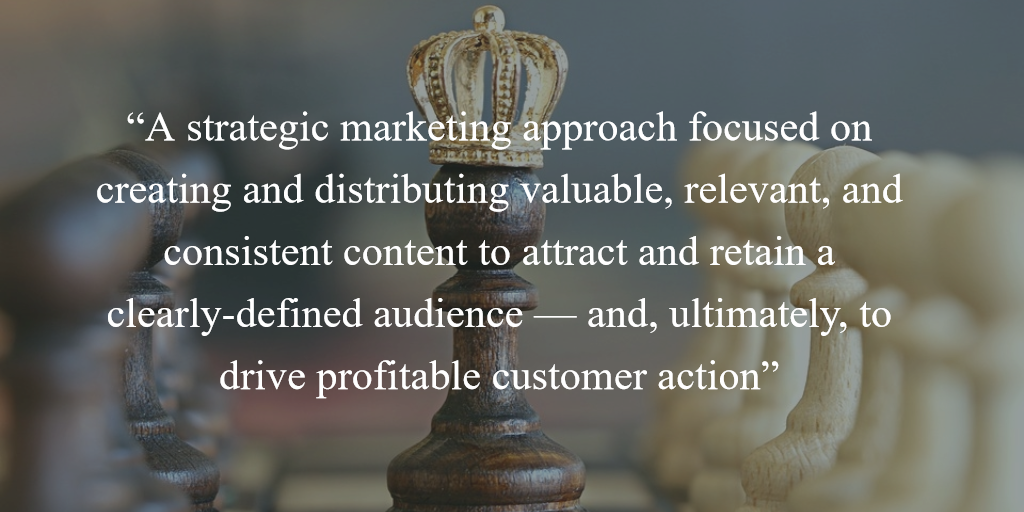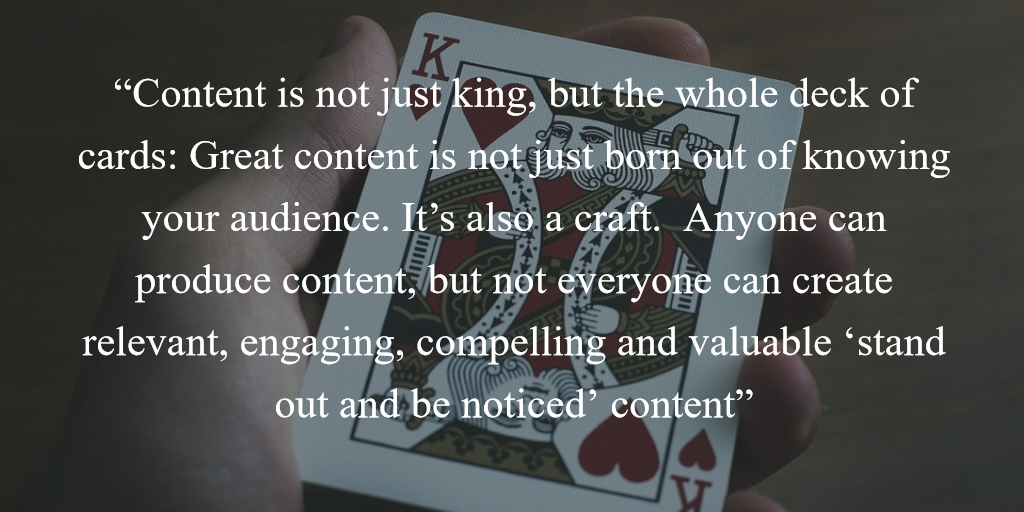
In 1996 Bill Gates wrote an article called ‘Content is King’. Over the years, this phrase has been cited over and over again, to the point that it no longer means what Bill Gates originally intended. Yet, the phrase was so powerful that it lives on today, albeit that it has been adapted, reinvented and updated over the last 20 years. So, what does it actually mean in the modern day?
I have yet to come across an article that denies that content is king, except on the odd occasion where someone has said it simply to provoke a reaction. Therefore, it will come as no surprise that I personally believe that content is the cornerstone of ALL marketing activity, and so actually is king. And I’m going to tell you why.
What is Content?
In a general sense, content is actually quite difficult to define, probably best evidenced by the fact that there isn’t a commonly accepted definition amongst the various online dictionaries. If we home in on content in a business sense, however, content is often referred to as ‘content marketing’.
Almost as if to prove the popularity and validity of content marketing as a concept, a Content Marketing Institute now exists! The Institute describes itself as “the leading global content marketing education and training organisation, teaching enterprise brands how to attract and retain customers through compelling, multi-channel storytelling”.
And the Content Marketing Institute (CMI) defines ‘content marketing’ as:
“A strategic marketing approach focused on creating and distributing valuable, relevant, and consistent content to attract and retain a clearly-defined audience — and, ultimately, to drive profitable customer action”.

In particular, note that the CMI outlines the concept as strategic.
The Importance of Content in a Marketing Strategy
Any marketing strategy worth its salt should include a content strategy. The term ‘content strategy’ can sometimes get a bad press but regardless of what you call it, no marketing strategy will be complete without due consideration given to content. In my opinion, content underpins every aspect of a marketing strategy, and has an impact on every marketing activity undertaken.
Think about it, what would your company brochures, or your website, or your social media profiles be without content? How would you attract visitors to an event without content leading up to that event? How would you promote your new products or services, regardless of the promotional method, without content? If you have ever tried to do any of these things, you will understand that content has to be crafted, from the words that need written, to the media required to depict your company or your products, to the email headings that need to stand out and get noticed. It’s all content.
What’s more, a marketing strategy that isn’t based on a content strategy is doomed to fail because there will be no consistency. A content strategy ensures that consistent messaging is woven into all of your marketing touch points.
If a content strategy is lacking or is inconsistent, you will confuse your audience, and work against any efforts to create a clear brand identity and a clear set of values and differentiators.
Digital Marketing and Content
With the rise of social media and the importance of search engine optimisation (SEO) in recent years, the concept of content being king has seen a resurgence.
Although there are around 200 ranking factors, it is widely accepted that quality content is extremely important when trying to get your website moved up the search rankings. In fact, Google outlines the importance of content in its own Search Engine Optimisation Starter Guide.

The guide states: “Creating compelling and useful content will likely influence your website more than any of the other factors”. Consider this for a moment. If the world’s leading search engine implies that content is king, then I’m not sure what other reason we need to comprehend the colossal significance of content!
Furthermore, other authorities on SEO such as Neil Patel or Brian Dean of Backlinko often wax lyrical about the importance of content that is ‘original’ or ‘unique’, ‘informative’ or ‘useful’ and ‘fresh’ or ‘frequent’.
The Importance of Quality Content
I have previously written about the skills required for a career in marketing and in this article I offer my opinion that you either have the ability to write content that will persuade, educate and influence, or you don’t.
Throughout my website, I quote others to support my own content. On the Content Strategy section of my website, I offer this quote, an extension of Bill Gates’ original phrase:
“Content is not just king, but the whole deck of cards: Great content is not just born out of knowing your audience. It’s also a craft. Anyone can produce content, but not everyone can create relevant, engaging, compelling and valuable ‘stand out and be noticed’ content”.

It was written by Gavin Miller, the Managing Director of a content agency, in an article for Marketing Week entitled “Brands need to focus on content or risk failure”, and to me, it perfectly sums up the importance of quality content.
Great marketing is built upon almighty content and that is why content really is king.
If you need help with your content strategy, find out more about our content strategy services.

